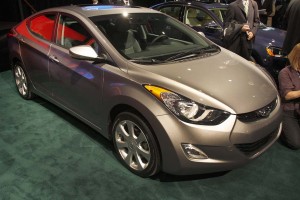
The Hyundai Elantra won N.A. Car of the Year this week while Hyundai itself took honors in a new survey for having the highest owner loyalty rate.
Apparently, it depends on who you ask and how you ask it. When it comes to owner loyalty, one new study puts Hyundai in the lead, while Ford tops the list in another.
Both makers list customer retention among the most important issues they face today. Industry analysts insist that customer loyalty not only translates into more sales, but also into reduced marketing costs, as it typically is less expensive to keep a buyer within a vehicle family than going out to “conquest” a new customers away from one of your competitors.
It also translates into higher residual values, according to Ford global marketing chief, Jim Farley, as products with loyal owners tend to retain more of their original price when it comes time to trade in.
The new J.D. Power Customer Retention Study put Hyundai in the lead, the latest kudo for a maker that also saw a 20% increase in sales last year to 645,000 in the U.S. A full 64% of Hyundai owners came back for another one of the Korean carmaker’s models in its latest survey.
“I’ve never seen loyalty that high,” John Krafcik, CEO of Hyundai Motor America, told TheDetroitBureau.com, adding that it is one of the reasons why the maker’s sales substantially exceed the corporate forecast last year.
Power saw Ford and Honda tied for second, at a still strong 60% retention rate. Chrysler’s sport-utility brand, Jeep, jumped 17% in the attest Power survey, more than any other manufacturer.
Perhaps not so coincidentally, Jeep also was the most improved brand in the latest Polk Automotive Loyalty Awards, there jumping 7.4% year-over-year.
But at that point, the two studies diverge. According to Polk, it was Ford topping the industry in terms of “Overall Loyalty to Manufacturer,” with 62.9% of its customers returning to buy another vehicle within the Ford family. The Detroit maker also ranked first in terms of “Overall Loyalty to Make,” 61.7% of owners coming back specifically for another Ford product.
Hyundai was nonetheless one of the top brands, marking a steady climb up the charts for a maker that CEO Krafcik acknowledges didn’t score especially well with consumers until relatively recently.
One of the things that’s apparently working for the Korean carmaker is the increasing breadth of its line-up. According to the research by J.D. Power a full third of new-vehicle owners who switched brands say they did so in order to find the sort of vehicle they wanted.
“Many automotive brands are expanding their array of models in an attempt to capture more buyers, but this isn’t enough in and of itself,” said Raffi Festekjian, director of automotive product research at J.D. Power and Associates. “Manufacturers need to integrate specific attributes and features that delight vehicle owners to maximize their opportunity to both retain customers and conquest from other brands. Manufacturers also need to ensure owners are satisfied with the quality, residual values and ownership costs of their vehicles.”
In fact, in his interview with TheDetroitBureau.com, CEO Krafcik noted that because of capacity constraints Hyundai likely won’t be able to boost 2012 sales as much as last year. Instead, the maker intends to focus more on improving quality and the ownership experience which, said the executive, will “pay off more in the long-run.”
While the overall results of the two owner loyalty surveys were generally similar, the slight differences may reflect the process by which the survey groups collected data, Polk focusing on a larger owner body throughout 2012, Power looking at a somewhat small group in two three-month periods near the beginning and then late in the year.
